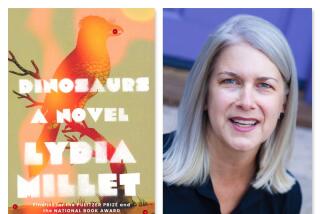BOOK REVIEW : A Generic Tale Spiced With Exotic Details : MY LIFE WITH DARWIN <i> by Molly Beth Tinsley</i> ; Houghton Mifflin, $19.95, 274 pages
- Share via
If you’re lucky enough to have spent a blissful childhood in the Ecuadorean rain forest or sufficiently gifted to imagine exactly what such a life might have been like, then fiction is your destiny.
In this original first novel, the background is so marvelously exotic and flawlessly created that the luster revives the subsequent story of a disintegrating suburban marriage. Although Hannah Worden’s existence as the harassed wife of a ‘60s radical who settled for bureaucracy and adultery is one of the generic tales of our time, her situation is so highly colored by her extraordinary past that any familiarity is completely overcome by novelty.
In her mid-30s, Hannah is the mother of four remarkably diverse children and the wife of Darwin Charles, a man whose personality is as perverse and capricious as his name. Hannah and Darwin met after she had graduated from her Uncle Samuel’s fundamentalist preparatory school, surviving an adolescence almost as unusual as her childhood. If the Ecuadorean rain forest was paradise, New Progress Christian School was purgatory: a joyless, rigid academy run by an ex-Army chaplain consumed by a pathological fear of communism. After a short stint as pastor of a Corn Belt parish, Uncle Samuel was recycled as headmaster of the school, “where his pessimism, combined with the military training, might be profitably utilized to extinguish the erratic fires of youth.”
Barely 13 when she arrives at the school, Hannah had been expelled from her home in the jungle when her missionary mother regretfully realized that her daughter was becoming as precocious and uninhibited as the Indian teen-agers who were her only companions.
Widowed when her husband was murdered by a tribe he’d hoped to convert, the mother had stayed in Ecuador to carry on God’s work, living contentedly among the people who had accepted her teachings and leaving young Hannah in the care of a loving Indian nurse-companion. Unworldly but astute, Mrs. Worden had always known that her daughter would eventually have to be sent to the States, and New Progress, led by her brother, seemed the logical answer.
Even after 25 years, Hannah has not entirely recovered from the shock of that move. She stoically endured the boarding school, even managing to make a few friends, but once she had her diploma, the tractable days were over. Refusing to attend a Bible college, she insisted upon a secular university and, as might be expected, fell promptly in love.
The object of her affections was Darwin, the diametric opposite of everything her preacher uncle and missionary mother would have wished. That, in fact, was his prime attraction. For Darwin, a girl whose father had been speared by savages was irresistible. You can’t get much farther from the ordinary than that.
Darwin’s radicalism, however, has curdled into mere truculence. He smokes pot in the shower and has successive affairs with each new employee; the classic example of an aging revolutionary co-opted by the system. Hannah’s remarkable experience hasn’t quite fitted her to cope with her unhappy and maladjusted 13-year-old son, a younger boy with an aberrant streak of violence, a super-conventional daughter and her sensitive and over-active youngest child.
Trying to find connections between her own lost world and the drastically different environment in which her family must live, she finally manages to weave the diverse strands together. The result is a novel as strong, surprising and graceful as the braided bridges that span the rivers of Ecuador.
Next: Carolyn See reviews “My Father’s War and Other Stories” by Barton Sutter (Viking) .
More to Read
Sign up for our Book Club newsletter
Get the latest news, events and more from the Los Angeles Times Book Club, and help us get L.A. reading and talking.
You may occasionally receive promotional content from the Los Angeles Times.








